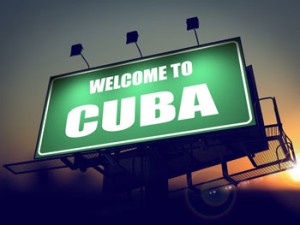Normalization of Relations with Cuba
 The Suarez Firm can assist clients with questions concerning the implications of the recent efforts by the Obama Administration to normalize relations with Cuba. While the U.S. embargo of Cuba remains in effect and most Cuba-related transactions continue to be prohibited to person subject to U.S. jurisdiction, on December 17, 2014, President Obama announced a plan for the United States to reestablish diplomatic relations with Cuba and to relax to a limited extent the U.S. embargo of Cuba.
The Suarez Firm can assist clients with questions concerning the implications of the recent efforts by the Obama Administration to normalize relations with Cuba. While the U.S. embargo of Cuba remains in effect and most Cuba-related transactions continue to be prohibited to person subject to U.S. jurisdiction, on December 17, 2014, President Obama announced a plan for the United States to reestablish diplomatic relations with Cuba and to relax to a limited extent the U.S. embargo of Cuba.
Effective January 16, 2015, the U.S. Treasury Department’s Office of Foreign Assets Control (OFAC) and the U.S. Commerce Department’s Bureau of Industry and Security (BIS) amended the Cuban Assets Control Regulations and the Export Administration Regulations to implement such changes. A joint Fact Sheet, released on January 15, 2015, by the U.S. Departments of Treasury and Commerce, describes the regulatory amendments to the Cuba sanctions regulations and can be found at the following website: http://www.treasury.gov/press-center/press-releases/Pages/jl9740.aspx
As summarized by the Departments of Treasury and Commerce, “[t]hese measures will facilitate travel to Cuba for authorized purposes, facilitate the provision by travel agents and airlines of authorized travel services and the forwarding by certain entities of authorized remittances, raise the limits on and generally authorize certain categories of remittances to Cuba, allow U.S. financial institutions to open correspondent accounts at Cuban financial institutions to facilitate the processing of authorized transactions, authorize certain transactions with Cuban nationals located outside of Cuba, and allow a number of other activities related to, among other areas, telecommunications, financial services, trade, and shipping” but they also caution that “[p]ersons must comply with all provisions of the revised regulations; violations of the terms and conditions could result in penalties under U.S. law.”
On February 13, 2015, the U.S. State Department released a list of goods and services eligible for importation that are produced by independent Cuban entrepreneurs, as determined by the State Department. This list is a “living document” that will be updated periodically and is seen as a further clarification of the regulations released in January. It takes a permissive “negative” approach to identify specific prohibited categories of items and to allow everything not specifically listed as permitted for importation into the United States.
 Most recently, on April 12, 2015, President Obama announced at the seventh Summit of the Americas in Panama his intention to remove Cuba from the U.S. list of state sponsors of terrorism, thereby eliminating a major obstacle to the restoration of diplomatic relations. White House officials stated that President Obama approved the recommendation of Secretary of State John Kerry to take Cuba off the terrorism list after a rigorous review of Cuba’s record and assurances from Havana that it would not support terrorism in the future. It should be noted that Cuba will not come off the list until after a 45-day review period, during which a joint resolution to block its removal could be considered in the House and in the Senate.
Most recently, on April 12, 2015, President Obama announced at the seventh Summit of the Americas in Panama his intention to remove Cuba from the U.S. list of state sponsors of terrorism, thereby eliminating a major obstacle to the restoration of diplomatic relations. White House officials stated that President Obama approved the recommendation of Secretary of State John Kerry to take Cuba off the terrorism list after a rigorous review of Cuba’s record and assurances from Havana that it would not support terrorism in the future. It should be noted that Cuba will not come off the list until after a 45-day review period, during which a joint resolution to block its removal could be considered in the House and in the Senate.
These are all important steps in establishing a constructive engagement with Cuba after more than 50 years of isolation . However, Congress must act in order to lift the embargo against Cuba to fully reestablish normal relations.
